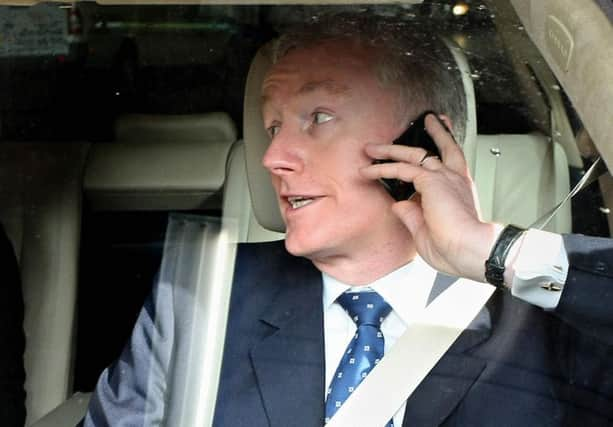Gordon Brown: Rogue bankers should be jailed for financial crisis


And a repeat of the “risk-laden” behaviour which led to the crash of 2008 is inevitable because the UK failed to punish the guilty bankers over their gambling with their institutions’ cash.
Royal Bank of Scotland and Lloyds were among the institutions only saved from collapse with the help of a £500 billion taxpayer-funded bailout of the entire financial system put in place by Brown during his time in Number 10.
Advertisement
Hide AdAdvertisement
Hide AdIn his memoir, My Life, Our Times, the former Kirkcaldy and Cowdenbeath MP reveals he had even told wife Sarah he would have to quit if his rescue plan failed. But he warns “little has changed” since 2009 and the banks that were deemed “too big to fail” were now even larger.
“If bankers’ conduct was dishonest by the ordinary standards of what is reasonable and honest, should there not have been prosecutions in the UK as we have seen in Ireland, Iceland, Spain and Portugal?” he states.
Iceland jailed 29 of its bankers deemed responsible for sinking its banking system. The country’s prime minister, Bjarni Benediktsson, recently criticised the UK for failing to take a similarly tough approach, insisting it helped “heal” the effects of the crisis.
Mr Brown suggested the Fraud Act should be used to tackle bankers who abuse their positions, make false representations or fail to disclose information.
“If bankers who act fraudulently in this way are not put in prison with their bonuses returned, assets confiscated and banned from future practice, we will only give a green light to similar risk-laden behaviour in new forms.”
At the height of the crisis in October 2008, the government and Bank of England announced a bailout package offering £500bn of support to banks.
Mr Brown said: “When I got up the next morning I told Sarah that she would have to be ready to pack our things for a sudden move out of Downing Street. If what I was about to do failed, with markets collapsing further and confidence ebbing from Britain, I would have no choice but to resign.”
But despite the bailout, Brown rues the inflated pay levels that are still enjoyed by leading bankers, particularly at RBS which is effectively a state-owned firm.
Advertisement
Hide AdAdvertisement
Hide Ad“The typical senior banker earns £1.3 million and Britain has three-quarters – more than 4,000 – of Europe’s €1m bankers, a figure that has risen 50 per cent since the crisis,” Mr Brown adds.
“Even at RBS, which has had £58bn of accumulated losses and is guaranteed by the taxpayer, the number of bank employees earning more than €m has barely changed – 121 down from 131. We still do not have the right balance between the capital that banks need, the dividends they pay, the remuneration they give employees and the contribution they make to the public for the social costs of their risk-taking.”
Traditional arguments that bankers receive inflated pay because they take risks has not survived the crash.
It was made clear that it was the government, and ultimately taxpayers, who bore the true risk.
“With many banks backstopped by the taxpayers, they make their profits at least in part because of the government guarantee,” Mr Brown added. “The risks they are taking is often not with their money but with ours.
“And often bankers are not being compensated for risk but rewarded for failure. It cannot be right that Fred Goodwin walked away with all of his past bonuses untouched, a reported tax-free lump sum of £5m, and even after he agreed to halve his pension it still was said to amount to £300,000 a year.”
The European Union had moved to cap bankers’ bonuses at a maximum of 200 per cent of salary, but Brown said the banks have been able to circumvent this by introducing a new category of remuneration called “fixed pay monthly allowances” – and by simply raising salaries.
“Dividends and bankers’ pay today represent almost exactly the same share of banks’ revenues as before the crisis hit,” he goes on. “While bonuses have fallen from their £19bn high in 2007-8 to around £14bn last year, the financial sector has paid out a total of £128bn in bonuses since 2008 – enough to recapitalise our banks.”